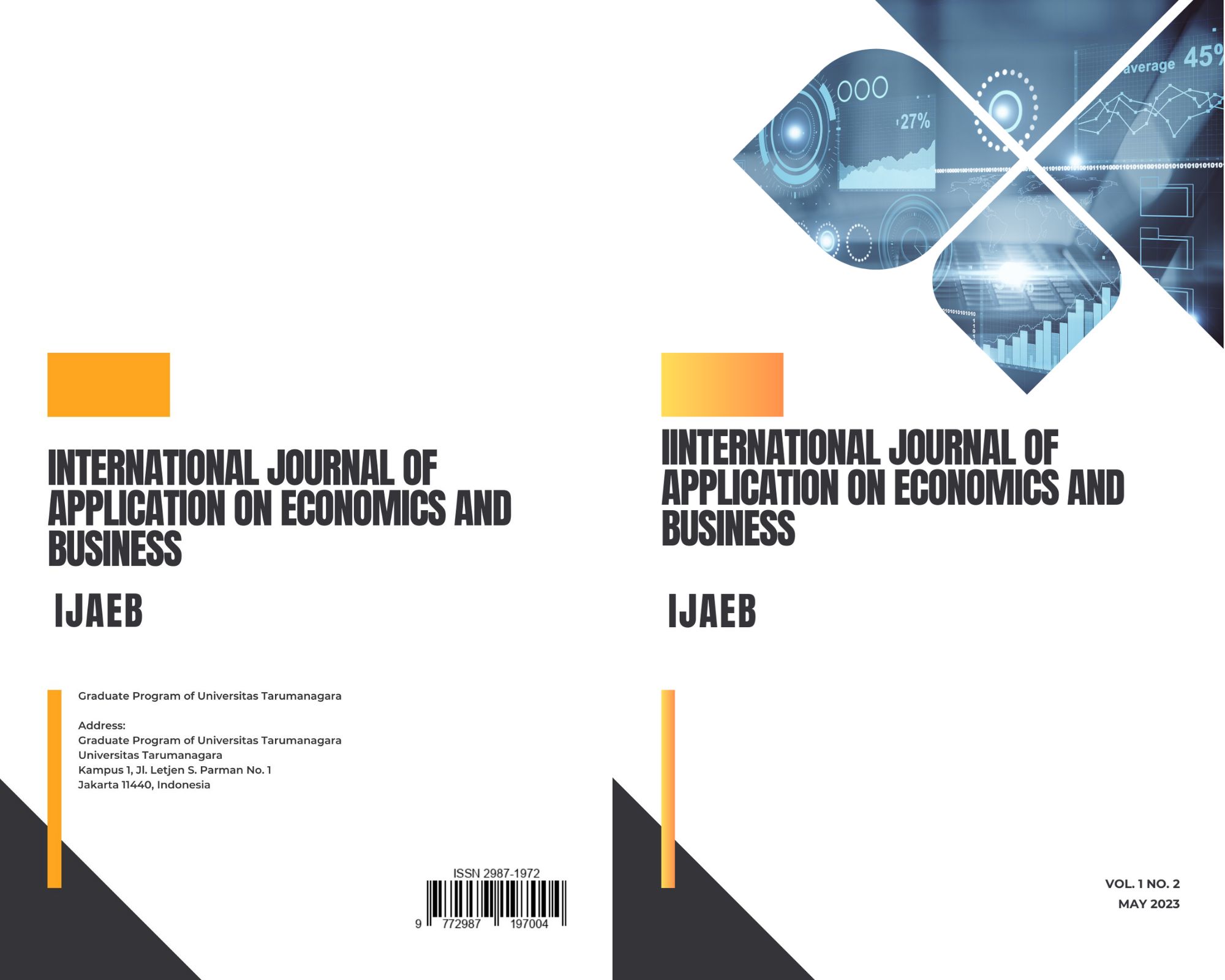THE EFFECT OF COMMUNICATION, SELF-EFFICACY AND POWER ON THE COMMITMENT OF EMPLOYEES
Main Article Content
Abstract
This study aims to determine the effect of communication, self-efficacy and power on the commitment of employees of PT XYZ. This research was conducted using a descriptive quantitative approach through survey techniques. The sample used amounted to 65 respondents came from employees of PT XYZ. Data analysis was performed using Partial Least Square – Structural Equation Model (PLS-SEM) using smartPLS 3.0 software. The results showed that communication, self-efficacy and power had a positive and significant influence on employee commitment at PT XYZ. This shows that if there is an increase or improvement in communication, self-efficacy and power are able to maintain and even increase employee commitment to the company, namely PT XYZ.. The thing that needs to be considered for the company is to pay attention and keep employees having high confidence in facing work challenges. Because of communication, self-efficacy, and power influence on the employees commitment, this research has theoretically and practically implication. Theoretically, employees commitment be created through how to build a good communication, notice the employees self-efficacy, and positive power implementation. Meanwhile for practically implication, management of PT XYZ could use this research as a hint of company policy making.
Article Details
Section

This work is licensed under a Creative Commons Attribution-NonCommercial-ShareAlike 4.0 International License.
This journal provides immediate open access to its content on the principle that making research freely available to the public supports a greater global exchange of knowledge.
IJAEB by Graduate Program of Universitas Tarumanagara is licensed under a Creative Commons Attribution-NonCommercial-ShareAlike 4.0 International License.. Permissions beyond the scope of this license may be available at https://journal.untar.ac.id/index.php/ijaeb
References
M. Sung, “Fostering a sense of belonging on university campus: a case study of Taiwanese Association,” Soonchunhyang University, 2021.
L. T. T. Loan, “The influence of organizational commitment on employees’ job performance: the mediating role of job satisfaction,” Management Science Letters, vol. 10, no. 1, pp. 3307–3312, 2021.
I. G. P. Kawiana, L. K. C. Dewi, L. K. B. Martini, I. & B. R. Suardana, “The influence of organizational culture, employee satisfaction, personality, and organizational commitment towards employee performance,” International Research Journal of Management, IT and Social Sciences, vol. 5, No. 3, pp. 35–45, 2018.
A. Alhadabi, & A. C. Karpinski, “Grit, self-efficacy, achievement orientation goals, and academic performance in University students,” International Journal of Adolescence and Youth, vol. 25, no.1, pp. 519– 535, 2020.
J. W. Choi, K. Y. Song, & S. K. Lee, “The effect of the organizational culture recognized by irregular workers on job satisfaction and organizational commitment,” Restaurant Business, vol. 118 no. 8, pp. 375–383, 2019.
D. E. Susilo, N. W. Soetjipto, A. Triwulan, R. Djuwitawati, A. Riswanto, W. Wasis, & F. P. Jaya, “The effect of employee commitment, culture, and leadership style on good governance performance of jombang district government,” Revista Espacios, vol. 27, no. 40, 2019.
B. Al-Jabari, & I. Ghazzawi, “Organizational commitment: a review of the conceptual and empirical literature and a research agenda,” International Leadership Journal, vol. 11, no. 1, 2019.
A. Cohen, “Organizational commitment and turnover: a met a-analysis,” Academy of Management Journal, 2017.
W. R. Carter, P. L. Nesbit, R. J. Badham, S. K. Parker, & L. K. Sung, “The effects of employee engagement and self-efficacy on job performance: a longitudinal field study,” The International Journal of Human Resource Management, vol. 29, no. 17, pp. 2483–2502, 2018.
A. Newman, M. Obschonka, S. Schwarz, M. Cohen, & I. Nielsen, “Entrepreneurial self- efficacy: a systematic review of the literature on its theoretical foundations, measurement, antecedents, and outcomes, and an agenda for future research,” Journal of Vocational Behavior, vol. 110, pp. 403–419, 2019.
G.R. Ferris, B. P. Ellen, C. P. McAllister, & L. P. Maher, “Reorganizing organizational politics research: A review of the literature and identification of future research directions,” Annual Review of Organizational Psychology and Organizational Behavior, vol. 6, pp. 299-323, 2019.
W. A. Hochwarter, C. C. Rosen, S. L. Jordan,G. R. Ferris, A. Ejaz, & L. P. Maher, “Perceptions of organizational politics research: past, present, and future,” Journal of Management, vol. 46, no. 6, 879–907, 2020.
S. R. U. Fikri, & H. U. Ubaidillah, “The effect of culture characteristics, commitment, and organizational communication on employee performance at educational institutions,” Indonesian Journal of Cultural and Community Development, vol. 10, no. 1, pp. 11–21. 2021.
J. Walden, E. H. Jung, & C. Y. K. Westerman, “Employee communication, job engagement, and organizational commitment: a study of members of the millennial generation,” Journal of Public Relations Research, vol. 29, no. 2-3, pp. 73–89, 2017.
A. Syaekhu, “Effect of personality and interpersonal communication on organizational commitment,” Jurnal Ilmiah Ilmu Administrasi Publik, vol. 8, no. 1, pp. 61–68, 2018.
D. Qurbani, & D. Solihin, “Peningkatan komitmen organisasi melalui penguatan efikasi diri dan kualitas kehidupan kerja,” Jurnal Bisnis dan Manajemen, vol. 8, no. 2, pp. 223–232, 2021.
B. K. Fung, A. Neolaka, & H. Sihotang, “Pengaruh efikasi diri dan kepuasan kerja guru terhadap komitmen organisasi pada spk sd dan smp di kecamatan kalideres dan cengkareng provinsi Jakarta,” Jurnal Manajemen Pendidikan, vol. 9, no. 2, pp. 154–172, 2020.
H. T. Cho, & J. S. Yang, “How perceptions of organizational politics influence self-determined motivation: the mediating role of work mood,” Asia Pacific Management Review, vol. 23, no. 1, pp. 60–69, 2018.
R. M. Yusuf, & D. Syarif, “Komitmen Organisasi,” Makassar: Penerbit Nas Media Pustaka, 2018.
D. Nofia, “The effects of interpersonal communication and organizational commitment on organizational citizenship behavior (at agam district government),” Third Padang International Conference On Economics Education, Economics, Business and Management, Accounting and Entrepreneurship (PICEEBA 2019), pp. 250–256, 2019.

